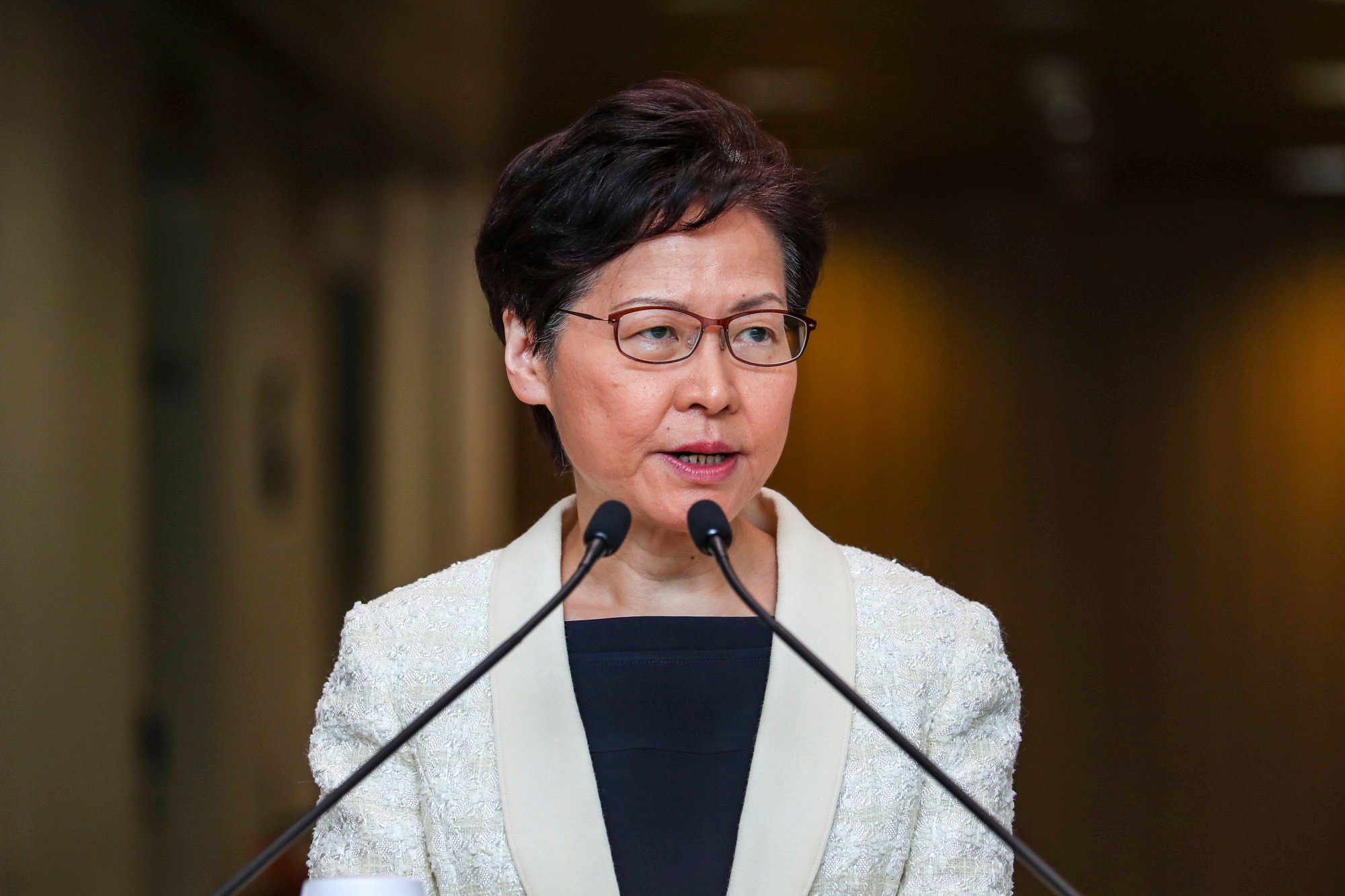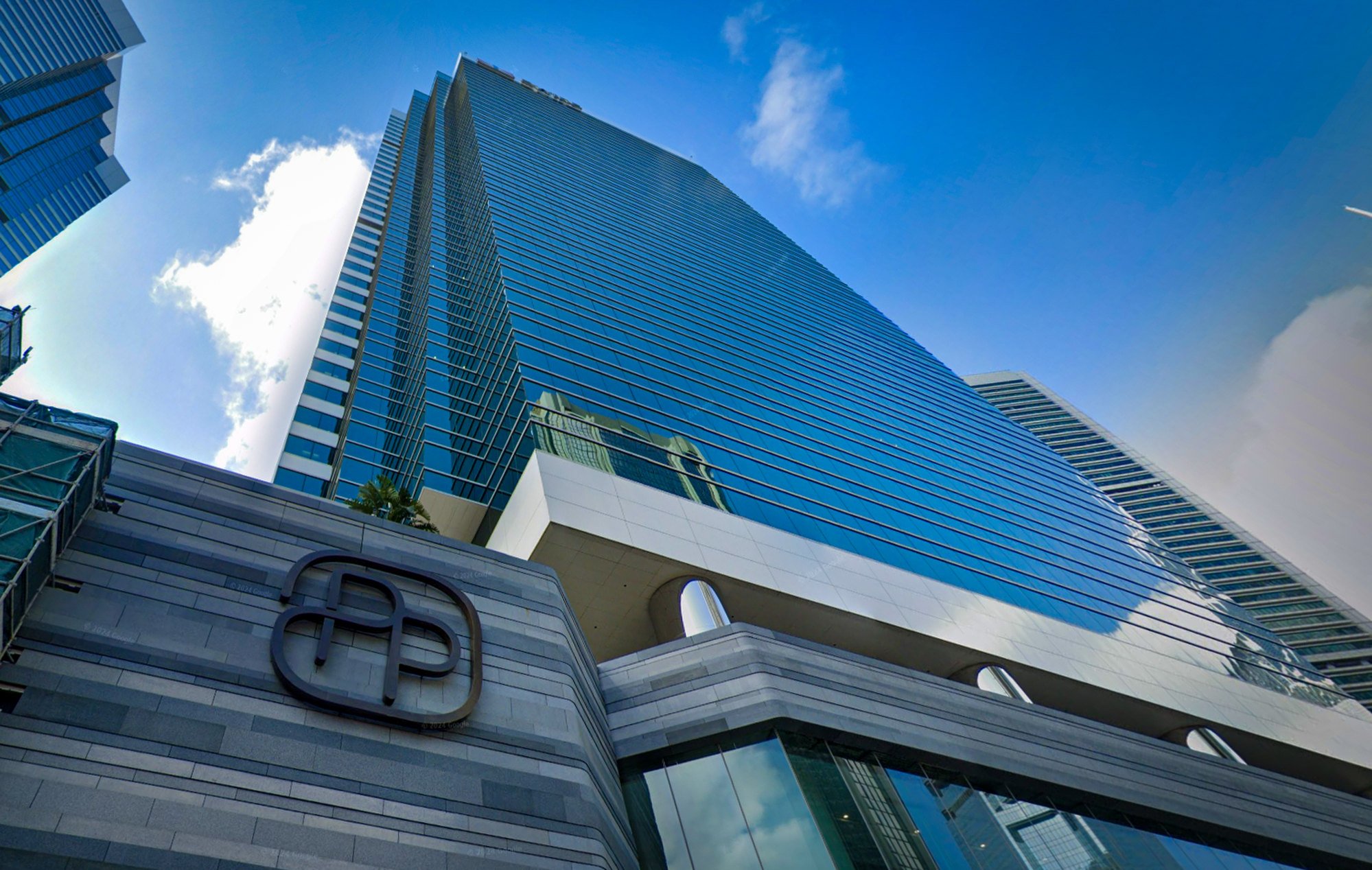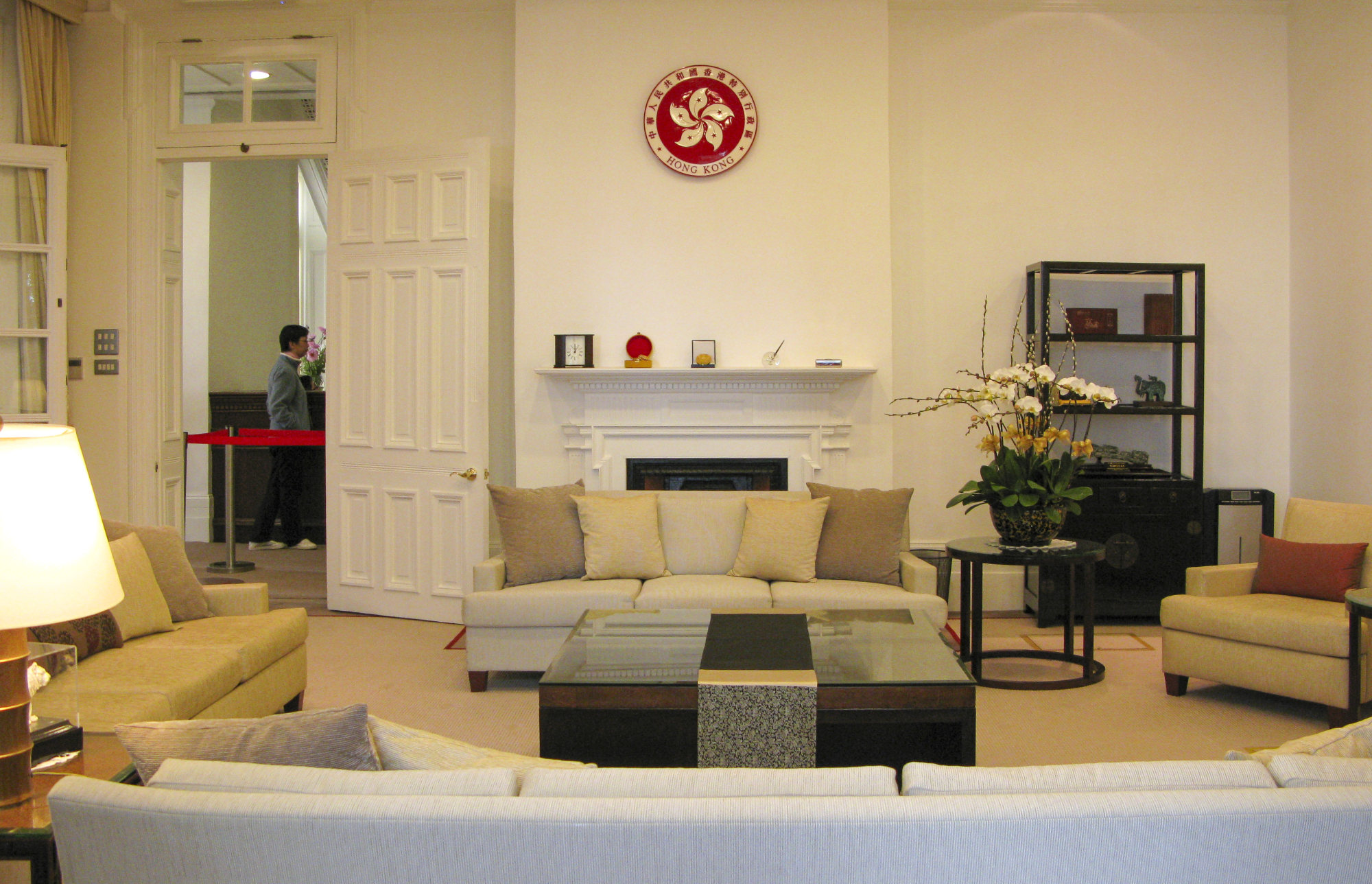The Chinese and Hong Kong flags stand tall at the entrance of a unit on the eighth floor of one of the city’s most prestigious commercial buildings.
The 2,874 sq ft space at the plush One Pacific Place in Admiralty is the office of former chief executive Carrie Lam Cheng Yuet-ngor, who stepped down at the end of her term in July 2022.
Her office became the talk of the town recently, after the government disclosed that it cost taxpayers an estimated HK$9.17 million (US$1.2 million) in the past financial year, including HK$5.67 million for rent and HK$2.86 million in staff expenses.
Do you have questions about the biggest topics and trends from around the world? Get the answers with SCMP Knowledge, our new platform of curated content with explainers, FAQs, analyses and infographics brought to you by our award-winning team.
That was more than 40 per cent of the HK$20.99 million that went to combined expenses incurred by the city’s four former leaders.
The hefty sum ignited debate over the prudent use of public funds by former officials, especially at a time when the economic downturn has resulted in belt-tightening by various government departments.
“They should take the initiative to explain how their work brought benefits to Hong Kong as we all expect to maximise their value by using public money,” veteran political commentator Lau Siu-kai said.
“We should provide reasonable respect to former leaders, but under the current economic situation, I don’t think it is a good practice to rent such an expensive office.”

The Administration Wing told the Post that Lam went to more than 700 of the 2,700 events attended by previous leaders between 2021 and last year.
When lawmakers at a special Finance Committee meeting last month asked whether the former leaders’ offices were cost-effective, Director of Administration Millie Ng Kiang Mei-nei said it was impossible to set key performance indicators because of the “unique” nature of their role.
She also told lawmakers that when Lam’s term ended, there were no suitable government offices available for her. She said the location had to match Lam’s “status and operational needs”.
Her department did not provide details of the “promotional and protocol-related” events attended by the former leaders over the past two years.
Tung Chee-hwa, 86, the first chief executive after Hong Kong returned to Chinese rule in 1997, remained active after stepping down and was a vice-chairman of the National Committee of the Chinese People’s Political Consultative Conference (CPPCC). He made his last public appearance in 2021 and has been reported to be ailing.
The city’s second chief executive, Donald Tsang Yam-kuen, 79, ended his term in 2012. He was the city’s first top official to be jailed, on a charge of criminal misconduct, but his conviction was subsequently quashed by the Court of Final Appeal in 2019. He has kept a low profile since.
Tsang’s successor, Leung Chun-ying, 69, has been a long-time advocate of Hong Kong’s integration with mainland China and is a vice-chairman of the National Committee of the CPPCC.
Lam, 66, did not take on any official role after leaving office at the end of a 42-year career in public service.
Her One Pacific Place office was rented at HK$377,000 per month on a three-year lease to support her “promotional and protocol-related work for Hong Kong”, according to the government.
Another HK$6.55 million was spent on renovation works and non-recurrent expenditure.

The Post recently visited the premises and found a large wooden structure at the entrance with a sign that said: “Office of Former Chief Executive of the Hong Kong Special Administrative Region”.
A person who came to the door said Lam was “working inside”, but denied the Post entry. Soon after, a security guard asked the Post to leave.
Two hours later, Lam was spotted heading out to lunch, accompanied by a bodyguard, but she declined to speak when approached by the Post.
What, exactly, does Lam do?
Lam largely disappeared from public life after leaving office. Her five-year term was marked by months of anti-government protests in 2019 over an extradition bill that was later dropped.
Her popularity rating plunged to the lowest among all post-1997 leaders during the social unrest.
She then had to deal with the Covid-19 pandemic, when Hong Kong imposed some of the harshest restrictions in the world.
Although lawmakers were told that Lam attended more than 700 events, a Post search of public records and news reports found references to her presence at only about 30 events last year.
Most were hosted by universities and business chambers on the mainland, and celebratory events in the city.
For example, she led a 40-strong business delegation to Fujian last November, after taking up roles as honorary chairwoman of the Jiangsu Hong Kong Chamber of Commerce and Fujian Hong Kong Chamber of Commerce.
In December, she was seen in the front row of a ceremony organised by the Federation of Hong Kong Hubei Associations to celebrate the lotus root festival.
In an interview with mainland media in November 2022, four months after stepping down, Lam said she did not need “a role” after retirement, but hoped to visit the mainland and speak about Hong Kong’s “one country, two systems” governing principle.
Throughout last year, Lam gave four speeches on that theme at four mainland universities, including Tsinghua University and Chinese University of Hong Kong’s Shenzhen campus.
In February 2023, Lam and her husband Lam Siu-por visited Singapore and met then prime minister Lee Hsien Loong and Senior Minister and Coordinating Minister for National Security Teo Chee Hean. They discussed possible collaboration between Hong Kong and the city state.
Little else could be found on public record about Lam’s other work, which may have gone unreported. There was no response from her office to a Post request for an interview.
Ballooning expenses of past leaders
Recent Legislative Council documents revealed that the total expenditure for all four former chief executives went up significantly from HK$12.63 million in 2021-22 to HK$17.85 million a year later and an estimated HK$20.99 million for 2023-24.
In the 2024-25 financial year, the total expenditure is expected to rise further to HK$22.07 million, with the government attributing it to “the increase in staff remuneration and other daily operating expenses”.
The first three former leaders have shared the Office of Former Chief Executives in an early 20th century building on Kennedy Road in Mid-Levels.
The 5,759 sq ft space previously housed the Sino-British Joint Liaison Group Office and the Hong Kong Design Centre, before the city’s first post-1997 leader, Tung, began using it in 2007.

The administration said the shared office had no room for a fourth ex-leader when Lam stepped down.
Unconvinced, lawmaker Michael Tien Puk-sun said: “Why not have all chief executives working under the same roof and share staff? Now the expense for personnel is times four. From the perspective of public money usage, that is ridiculous.”
‘Past leaders deserve respect’
In Western countries including the United Kingdom and its former colonies, it is common for former heads of government to be provided an office and administrative support.
In Hong Kong, it was never an issue before 1997 as British governors returned home at the end of their tenure.
It was only in 2005, before Tung was preparing to step down, that the local government asked an independent commission to come up with arrangements.
The commission recognised that a former chief executive should be “accorded the respect and status” due to someone who had held the most important public position in the city.
It said a former leader could make use of his or her unique experience of heading an outward-looking international city and international connections to “enhance the profile of the country and Hong Kong”.
It recommended providing an office, administrative support, personal security service and a car with a driver, among other services.
“The package of services to be made available for a former chief executive should only contain the elements ... necessary to support him to discharge his ‘ambassadorial duties’,” its report said.
It said “ambassadorial activities” could refer to meeting mainland and overseas dignitaries who visited the city, and addressing mainland and international audiences through conferences and speaking engagements.
The services provided should be publicly defensible, with public money being well-spent, it added.
A Post check of budgets from 2020 to 2024 showed no specific expenditure items listed for the offices of former leaders.
The public only learned the details when lawmakers put questions to the government’s Administration Wing during the annual Special Finance Committee meetings.
Hong Kong’s former leaders appear to receive considerably more than ex-British prime ministers, who are entitled to claim up to £115,000 (US$144,300) a year for life for office and secretarial costs.
Hong Kong has not set a maximum budget for its former leaders.
Should Lam move from Admiralty?
Former British prime ministers are also allowed to return to serve in governments led by others. David Cameron, for example, is currently foreign minister in Prime Minister Rishi Sunak’s cabinet.
In Singapore, the late founding prime minister Lee Kuan Yew and his successor, Goh Chok Tong, continued as senior ministers after stepping down from the top job. Lee Hsien Loong, who handed over to his deputy Lawrence Wong on Wednesday, also remains in the cabinet as a senior minister.
Unlike Hong Kong leaders Tung and Leung, who served as vice-chairmen of China’s top political advisory body, the CPPCC, Lam has not yet been appointed by Beijing to any role.
The three-year lease of her office in Admiralty will expire in the middle of next year.
Political analysts argued that the best way to avoid controversy, especially when Hong Kong’s ballooning deficit was expected to hit HK$101.6 billion in the current financial year, was to provide Lam and future retired leaders space in government properties.
Lawmaker Tien suggested that if the Mid-Levels shared office did not have enough space, the oldest former leader should make way for the newest.
Political analyst Lau, a consultant to the semi-official Chinese Association of Hong Kong and Macau Studies think tank, said he saw nothing wrong with former leaders using their networks to expand support for the city.
But he said it was hard to evaluate how effectively public money was spent on the former leaders as most of their activities were not seen by the public.
John Burns, honorary professor at the department of politics and public administration at the University of Hong Kong, said the issue of allowing Lam to rent a separate office was not about fairness, but the role former leaders were expected to play.
These could include supporting or advising the current government, and promoting Hong Kong.
“Although Hong Kong should respect its former leaders, respect is earned not commanded. Accountability and transparency help rebuild trust and respect,” he said.
More from South China Morning Post:
- Ex-Hong Kong leader Carrie Lam needs office costing HK$9 million annually to match status, admin chief tells sceptical lawmakers
- Annual operating costs for offices of ex-Hong Kong leaders reach HK$21 million, with Carrie Lam’s workplace accounting for 44%
For the latest news from the South China Morning Post download our mobile app. Copyright 2024.





